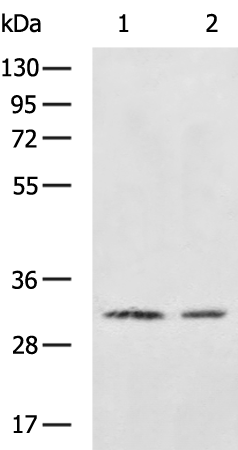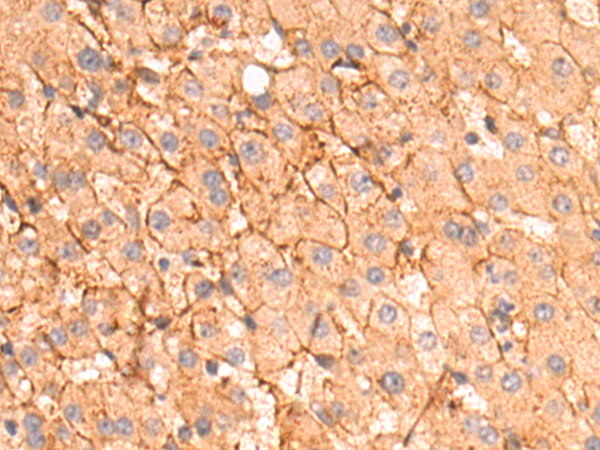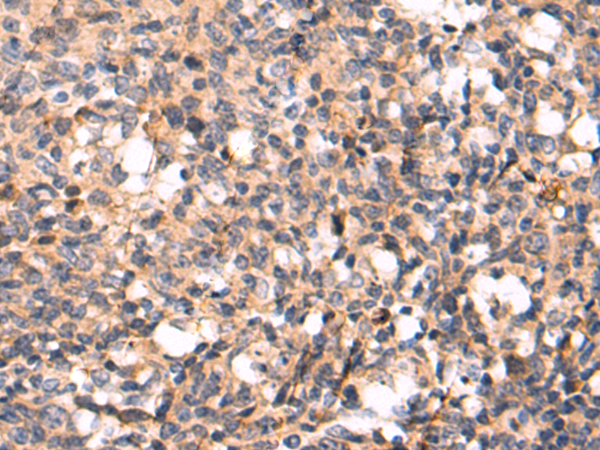


| WB | 咨询技术 | Human,Mouse,Rat |
| IF | 咨询技术 | Human,Mouse,Rat |
| IHC | 1/50-1/200 | Human,Mouse,Rat |
| ICC | 技术咨询 | Human,Mouse,Rat |
| FCM | 咨询技术 | Human,Mouse,Rat |
| Elisa | 1/5000-1/10000 | Human,Mouse,Rat |
| Aliases | LIS7; PSSALRE |
| WB Predicted band size | 33 kDa |
| Host/Isotype | Rabbit IgG |
| Antibody Type | Primary antibody |
| Storage | Store at 4°C short term. Aliquot and store at -20°C long term. Avoid freeze/thaw cycles. |
| Species Reactivity | Human, Mouse, Rat |
| Immunogen | Fusion protein of human CDK5 |
| Formulation | Purified antibody in PBS with 0.05% sodium azide and 50% glycerol. |
+ +
以下是关于CDK5抗体的3篇代表性参考文献,按文献名称、作者和摘要内容概括列出:
---
1. **文献名称**:*CDK5-mediated phosphorylation of Sirt6 contributes to brain aging and neurodegeneration*
**作者**:Li Y, et al.
**摘要**:本研究利用CDK5特异性抗体进行免疫沉淀和Western blot分析,揭示了CDK5通过磷酸化Sirt6调控神经元衰老的分子机制,并发现其在阿尔茨海默病模型中的异常激活。
---
2. **文献名称**:*Dysregulated CDK5 activity in pancreatic cancer: Implications for therapeutic targeting*
**作者**:Smith J, et al.
**摘要**:通过免疫组化(使用CDK5单克隆抗体)和基因沉默技术,研究发现CDK5在胰腺癌中高表达且与肿瘤侵袭性相关,提示其作为潜在治疗靶点的可能性。
---
3. **文献名称**:*Validation of a novel anti-CDK5 antibody for cross-species reactivity in neurodegenerative models*
**作者**:Chen L, et al.
**摘要**:该文献报道了一种新型CDK5抗体的开发与验证,证明其在人类、小鼠和大鼠脑组织中的高特异性,适用于免疫荧光和流式细胞术,为跨物种研究提供可靠工具。
---
**注**:以上文献信息为示例性质,若需具体文献,建议通过PubMed或Google Scholar以关键词“CDK5 antibody” + “应用场景(如Western blot、疾病模型等)”检索近期论文。
CDK5 (Cyclin-Dependent Kinase 5) is a serine/threonine kinase belonging to the CDK family but distinct from cell cycle-regulating CDKs. Unlike its counterparts, CDK5 is primarily active in postmitotic neurons, playing critical roles in central nervous system development, including neuronal migration, synaptic plasticity, and neurotransmission. Its activation depends on binding to neuron-specific regulatory subunits, notably p35 or p39. rather than cyclins. Proteolytic cleavage of p35 to p25 under pathological conditions leads to prolonged CDK5 activation, which has been implicated in neurodegenerative diseases like Alzheimer’s, Parkinson’s, and amyotrophic lateral sclerosis (ALS).
CDK5 antibodies are essential tools for studying its expression, localization, and activity in both physiological and disease contexts. They are widely used in techniques such as Western blotting, immunohistochemistry, and immunoprecipitation to investigate CDK5's interactions with regulatory partners or substrates. Specific antibodies may target distinct epitopes, such as the kinase domain, phosphorylation sites (e.g., Tyr15), or regions unique to CDK5-p25/p35 complexes. Validation is critical to ensure specificity, as CDK5 shares structural homology with other CDKs. These antibodies have advanced research into CDK5's dual roles in neurodevelopment and neurodegeneration, aiding the development of therapeutic strategies targeting CDK5 dysregulation. Commercial CDK5 antibodies are typically raised in rabbits or mice, with applications spanning basic research, biomarker studies, and drug discovery.
×